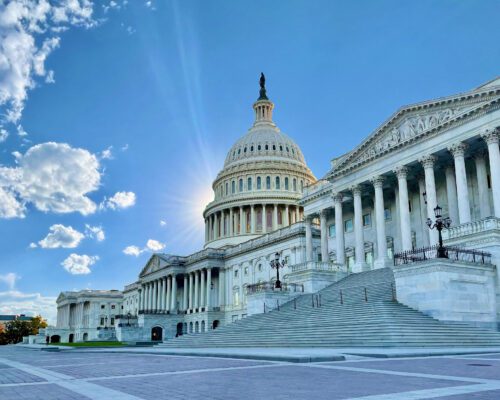News consumption does not merely inform us, it forms us, argues Jeffrey Bilbro in his new book Reading the Times: A Literary and Theological Inquiry Into the News. Our daily scrolling of the news may seem routine, but it shapes our sense of who we are, our values, and how we see the world we live in. As such, Bilbro calls readers to gain perspective on the nature and purpose of news and the power it has to shape and form communities around its content. Reading the Times helpfully suggests practices, or “liturgies,” to offset the side-effects of our media-saturated habits and cultivate healthier rhythms of life and reading. Below are some of the insights Bilbro shared from his important book on our relationship with the news.
Your latest book is a “literary and theological inquiry into the news.” What is the purpose of news, and why do we need a practical theology for how we consume it?
Part of the challenge with considering how to understand and relate to what we might classify as “the news” is that it serves so many roles in our lives today. The news can give useful information about the weather or local happenings; it can provoke outrage; it can help us understand complex and ongoing events like a pandemic or climate change or economic trends; it can amuse; it can foster a sense of community among those who share particular moral convictions or cultural affinities; it can relieve boredom; and it can direct our attention toward particular people or events. Some of these purposes are good and some aren’t so good.
In this book, I reflect on how our citizenship in heaven and God’s call to love our neighbor might shape how we attend to contemporary affairs. What do we need to know to love our neighbors well? Or, to frame the question differently, to what do we need to attend in order to live faithfully in this place and in this time?
The title is inspired by a Henry David Thoreau quote, “Read not the Times, Read the Eternities.” What is the significance of this Thoreau’s words today?
Thoreau was writing during a time of rapid technological change when the telegraph and other technologies were rapidly increasing the speed and reach of the news. People were becoming inundated with information about distant events, and it was difficult to discern what they should pay attention to. Thoreau warned that our human tendency is to get distracted by unimportant, titillating news: he jokes that when the transatlantic telegraph cable is in place, “perchance the first news that will leak through into the broad, flapping American ear will be that the Princess Adelaide has the whooping cough.” In response to this altered information ecosystem, Thoreau recommended dedicating most of our attention to words and ideas, and stories that have stood the test of time.
In many respects, Thoreau’s advice parallels what the Apostle Paul writes in Philippians: “whatever is true, whatever is honorable, whatever is just, whatever is pure, whatever is lovely, whatever is commendable, if there is any excellence, if there is anything worthy of praise, think about these things.” If we are rooted in these eternal verities, we will be better able to discern which contemporary events are important for us to know about and how we should respond to them.
What are chronos and kairos, and how does the tension between these understandings of time affect how we interpret current events?
Chronos is basically our modern understanding of time as quantifiable duration. It’s linear and sequential. Kairos names a kind of propitious time, time that is right for a certain action: it’s time to plant a crop, time to drink a cup of coffee, time to celebrate Easter. Chronos names the horizontal timeline on which human history plays out, and kairos names the pattern of God’s redemptive work within creation. Christians are caught between these two times. The Old Testament prophets provide good examples of how to navigate this tension as they connect particular, historical injustice or sin with the recurring acts of divine judgment and redemption.
Phrases like “the wrong side of history” or “the arc of history” indicate that chronos is the horizon against which the morality of particular events can be judged, and they suggest that humans are somehow morally progressing as history unfolds. Christians should be skeptical, I think, of this Hegelian view of historical progress, and such a view of time can lead us to overvalue the news. What happens in history does matter, but it matters not because it can be slotted into some arc of moral improvement. Rather, events matter because they are part of God’s ongoing work in his creation. The prophets judge current affairs against that divine pattern of action: idolatry or economic inequality is not on the wrong side of history, but they are on the wrong side of God’s character and commands. So the prophets—and the later heirs of this prophetic tradition—can guide us toward a better way of assessing the significance of current events. To put it in the terms of Thoreau’s dictum, they judge the times on the basis of the eternities.
You’ve included “liturgies” that media consumers can practice to offset common maladies tied to news intake. Why did you decide to include this in the book? What is one example of a helpful practice?
I’ve been encouraged by the recent theological retrieval of the importance of liturgies. The church has long known that what we habitually do with our bodies shapes our thinking, and more people seem to be remembering this reality of human nature. If we check our social media feeds the first thing each morning, we’ll inadvertently base our emotional posture toward the day on the latest outrageous story. If the TV is on in the background of our living rooms, it becomes the backdrop against which we understand the meaning of our lives. So the liturgies I recommend are meant to invite readers to reflect on how they might practice their theological convictions regarding the news—and how in turn their practices might be shaping their theological convictions.
For instance, the simple act of taking a walk through your neighborhood can recalibrate your attention away from the distant dramas playing out on a screen and toward the neighbors among whom you live. What is happening in this place and with these people? What might you need to know to dwell more faithfully and redemptively here? We may still need to read and learn about events happening far away, but regularly walking among and talking to our neighbors might help us better understand the relative importance of distant events.
How can Christians better practice discernment while consuming the news?
Discernment is not an individual skill we can hone with a few mental tricks or technological hacks. It’s a communally-formed habit of mind. As I write in the book, belonging well precedes thinking well. Social psychologists such as Daniel Kahneman and Jonathan Haidt have argued—persuasively, I think—that the vast majority of our reactions and decisions are based on socially-formed intuitions and biases rather than on deliberate, careful reasoning. If we imagine ourselves belonging primarily to a political party or an ideological group, we’ll filter all that we read through this identity. As Christians, however, our primary community should be the Church. We’ll be better able to discern the significance of the news that we read to the extent that we are formed as members of Christ’s body.
You discuss the ways that online and public communities have affected us in a digital age. What do you mean when you say, “What we really need is to be shaped by embodied communities that are rooted outside the public sphere and its unhealthy dynamics”?
Particularly in the wake of COVID-19, more and more of our relationships are mediated digitally. Some online communities can be genuinely life-giving, but the digital public square tends to foster unhealthy forms of belonging: it encourages swarms of outrage, virtue-signaling, and moral grandstanding rather than the patient, difficult work of building lasting friendships. We need such friendships and thick communities, however, both for the sake of our own spiritual formation and to help guide us as we seek to love our neighbors and participate redemptively in our broader communities. I point to Dorothy Day and Frederick Douglass as two examples of Christians who belonged well to embodied communities and wrote and published for a wider audience on the basis of that belonging.
You can order Reading the Times: A Literary and Theological Inquiry into the News here.










